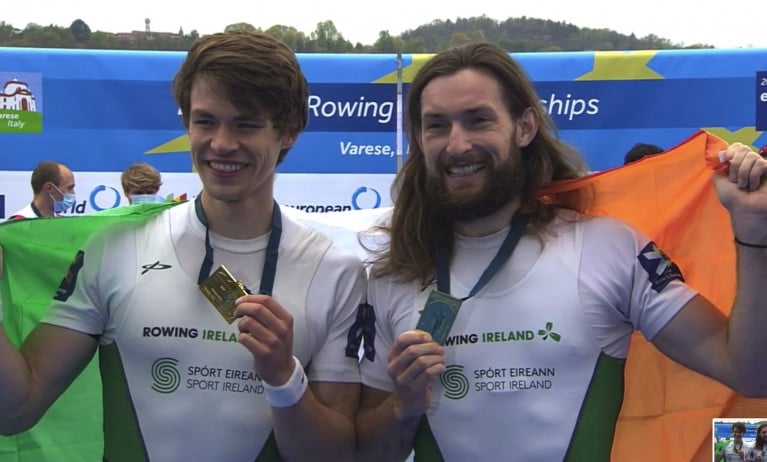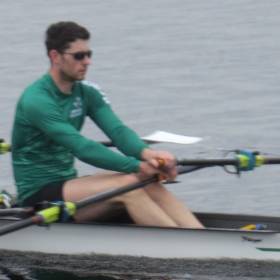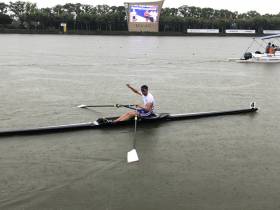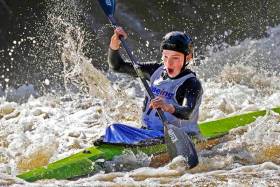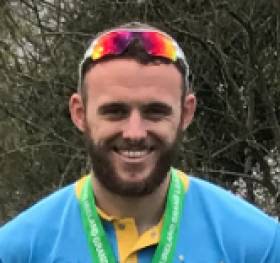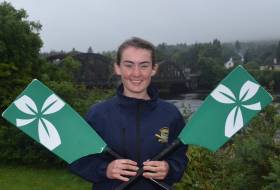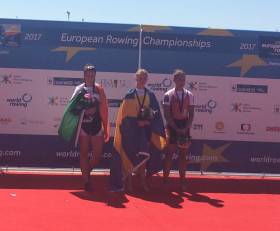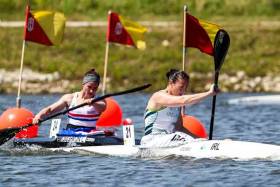Displaying items by tag: Gold
Gold for O'Donovan and McCarthy at European Rowing Championships
Paul O’Donovan and Fintan McCarthy won gold for Ireland at the European Rowing Championships today in Italy, adding to an excellent silver for the women’s four earlier.
The Ireland lightweight double saw off a spirited display by Germany, who led early on. Ireland moved decisively through the middle stages and took over the lead at 1300 metres. They then sprinted through the final few hundred metres to win by a length from Germany, with Italy third.
“It was a decent race, it’s good to be back,” O’Donovan said. “I was off last season so Fintan raced in the single last year. Fintan is just dragging me along in the double. We need bigger biceps. We’re gonna work on some curls which will see us through to the end of the summer.”
The Ireland women’s four looked impressive as they took silver in Varese.
The crew of Aifric Keogh, Eimear Lambe, Fiona Murtagh and Emily Hegarty raced so well that they pushed up very close to the Netherlands in a push for gold.
The new Irish combination started slowly, but slotted into the leading trio of the Dutch, British and Irish. In the third quarter the Ireland four pushed through Britain and then tested the Dutch coming to the line.
Britain, with Rebecca Shorten of Northern Ireland in the stroke seat, took bronze.
Keogh said: “The medal this year means a lot to us because were so close to Olympic qualification. A lot of crews from Ireland are already qualified, and for us to be able to finish that close to the Dutch is a really huge confidence boost.”
Earlier, the women’s pair of Aileen Crowley and Monika Dukarska showed well in the early stages of their A Final, but in a hot race they were pushed back to sixth at the finish. Britain’s Helen Glover and Polly Swann justified their favouritism to race to gold – but they were given a battle by Romania, while Spain took the bronze.
The racy lightweight double scull of Aoife Casey and Margaret Cremen gave a good performance in a superb final. Italy were the surprise winners from Britain and the Netherlands, with Ireland taking fifth.
Gary O’Donovan had to settle for fourth in his A Final of the lightweight single sculls. The race belonged to Peter Galambos of Hungary: he led through all four quarters. O’Donovan made ground in the closing stages, but was 4.3 seconds off Galambos at the finish.
Lydia Heaphy got off to a great start in the lightweight women’s single and led early on. However, Alena Furman of Belarus moved swiftly into the lead and stretched it down much of the course to win gold. Heaphy finished sixth.
Enniskillen woman Holly Nixon teamed up in the Britain double with Saskia Budgett to take a bronze medal in a race won by Romania.
European Rowing Championships, Varese, Italy, Day Three (Irish interest)
Men
Double Sculls – B Final (Places 7 to 12): 1 Ireland (R Byrne, P Doyle) 6:21.47, 2 Italy 6:22.52, 3 Germany 6:23.29.
Single Sculls – C Final (Places 13 to 18): 1 Russia 7:08.08, 2 Ireland (D Lynch) 7:09.01.
Lightweight Double – A Final: 1 Ireland (F McCarthy, P O’Donovan) 6:18.14, 2 Germany 6:19.94, 3 Italy 6:21.05.
Lightweight Single Sculls – A Final: 1 Hungary (P Galambos) 7:01.52; 4 Ireland (G O’Donovan) 7:05.82.
Women
Four – A Final: 1 Netherlands 6:27.51, 2 Ireland (A Keogh, E Lambe, F Murtagh, E Hegarty) 6:27.96, 3 Britain (4 R Shorten) 6:31.27.
Pair – A Final: 1 Britain 7:02.73; 6 Ireland (A Crowley, M Dukarska) 7:11.83.
Double Sculls – A Final: 3 Britain (1 H Nixon) 6:55.13.
Lightweight Double – A Final: 1 Italy 6:58.66, 2 Britain 6:59.56, 3 The Netherlands 7:01.13; 5 Ireland (A Casey, M Cremen) 7:07.42.
Lightweight Single Sculls – A Final: 1 Belarus (A Furman) 7:41.81; 6 Ireland (L Heaphy) 7:58.70.
Byrne Adds Under-23 Gold to World Championship Silver Medal
#Rowing: Ronan Byrne won gold for Ireland at the European Under-23 Championships in Ioannina, Greece, this morning. He beat Russia’s Alexander Vyazovkin by four seconds in the single sculls final.
The Ireland women’s coxed four took fifth in their straight final, while Hugh Moore was fourth in his B Final of the lightweight single, 10th overall, and the double of Alex Byrne and Ross Corrigan took second in their C Final, 14th overall.
European Under-23 Championships, Ioannina, Greece, Day One (Selected Results; Irish interest)
Men
Double Sculls – C Final: 2 A Byrne, R Corrigan 6:43.69.
Single Sculls - A Final: 1 R Byrne 6:48.28.
Lightweight Single – B Final: 4 H Moore 7:30.07.
Women
Four, coxed - Final: 5 Ireland (C O’Brien, K Shirlow, L Murphy, N Casey; cox: A Humphries-Griffiths) 7:20.37.
World Championship Gold for Puspure and Ireland
#Rowing: Sanita Puspure won Ireland’s second gold medal at the World Rowing Champinships at Plovdiv in Bulgaria today. She grabbed the lead in the single sculls final right from the start and never let it go. Defending champion Jeannine Gmelin moved to catch her in the third quarter, but the Ireland sculler stayed strong and extended her lead. She tired a little in the final quarter – and grew her advantage even more. She was clear by over two lengths at the finish.
World Rowing Championships, Plovdiv, Bulgaria, Day Eight (Irish interest):
Men
Double Sculls – B Final (Places 7 to 12): 1 Netherlands 6:05.10, 2 Poland 6:05.10, 3 Ireland (P Doyle, R Byrne) 6:08.81.
Women
Double Sculls – C Final (Places 13 to 18): 1 Ireland (M Dukarska, A Crowley) 6:54.55, 2 Chile 6:57.29, 3 Italy 6:58.17.
Single Sculls – A Final: 1 Ireland (S Puspure) 7:20.12, 2 Switzerland (J Gmelin) 7:25.93, 3 Austria (M Lobnig) 7:29.51.
Gold for McKeown of Queen's at World University Rowing
#Rowing: Sam McKeown of Queen’s University, Belfast, won gold in the single sculls at the World University Rowing Championships in Shanghai. McKeown, representing Britain, topped the podium, with China’s Zhi Chen and Joel Naukkarinen of Finland taking silver and bronze.
Fisu World University Rowing Championships, Shanghai
Men
Single Sculls – A Final: 1 Britain (S McKeown) 6:57.74, 2 China (Chen Zhi) 7:00.24, 3 Finland (J Naukkarinen) 7:03.89.
#Canoeing: Ronan Foley took gold medals on Saturday and Sunday at the canoe marathon World Cup in in Viana do Castelo in Portugal. The Kilcullen man dominated the short race on Saturday, and then sprinted away from his rivals on the last portage to win the marathon test on the Sunday.
Barry Watkins took silver in the senior race over the short course on Saturday and took 10th on Sunday – recovering from an unwanted swim in rough conditions.
Canoe Marathon World Cup, Viana Do Castelo, Portugal (Irish interest; selected results):
Saturday
Men – K1 Short Race: 2 B Watkins 13:46.15.
K1 Short Race, Juniors: 1 R Foley 14 min 52.43 sec.
Sunday
Men – K1 Marathon: 10 Watkins 2 hr 21 min 10.20.
K1 Marathon, Junior Final: 1 Foley 1 hr 53 min 7.34 sec.
Murphy Adds Gold in New Zealand
#Rowing: Max Murphy added a gold medal to the silver he had won in the men’s senior pair at the New Zealand Rowing Championships today. The UCD oarsman was part of the Waikato senior eight which were clear winners, beating a crew from their own club into second. Kevin Neville and Eamon Power of NUIG were in the Wellington crew which took bronze.
In warm and calm conditions, Paul O’Donovan and Gary O’Donovan finished fourth in the Premier double sculls, an elite event won by Chris Harris and Robbie Manson.
New Zealand Rowing Championships, Lake Karapiro, Day Four (Irish interest)
Men
Eight – Senior
Final: 1 Waikato (3 M Murphy) 5:56.41; 3 Wellington (7: K Neville; 8 E Power) 6:00.28.
Pair - Senior
Final: 2 Waikato (M Murphy, T Bedford) 6:59.41.
Sculling,
Double – Premier
Final: 4 Skibbereen (P O’Donovan, G O’Donovan) 6:38.66. Senior – B Final: 1 Wairau (2 K Neville) 6:46.04.
Single – Club
B Final: 5 Wairau (E Power) 8:11.15.
World Rowing Gold Medallists Return
#Rowing: Ireland gold medallists Paul O’Donovan, Shane O’Driscoll and Mark O’Donovan arrived back in Ireland today from the World Rowing Championships in Florida. They flew from Orlando to Dublin where family and friends greeted them. They were accompanied by Gary O’Donovan, an Olympic medallist in 2016 and reserve for the World Championships team. This evening they will be honoured at a reception in Skibbereen.
Golden Girl O'Brien Extends Ireland Run at Coupe Rowing
#Rowing: Georgia O’Brien of Kenmare took Ireland’s second gold of the day at the Coupe de la Jeunesse regatta in Hazewinkel in Belgium this afternoon. The single sculler had won her heat in the morning session and she did it again in the A Final in a slightly faster time, just pipping France’s Virginie Liot. Britain’s Jane Hardie took the bronze.
Earlier, the Ireland junior men's quadruple had taken gold.
Coupe de la Jeunesse, Hazewinkel, Day One (Irish interest)
Junior Men
Four – Heat One (First Three to A Final): 3 Ireland (A Johnston, R Corrigan, B Connolly, N Timoney) 6:23.78. A Final: 5 Ireland 6:27.89.
Quadruple – Heat One: 1 Ireland (B O’Flynn, M Dundon, J Keating, J Quinlan) 6:12.81. A Final: 1 Ireland 6:12.16, 2 Italy 6:14.58, 3 Britain 6:15.07.
Junior Women
Single Sculls – Heat Two (First Three to A Final): 1 Ireland (G O’Brien) 8:10.17. A Final: 1 Ireland 8:09.83, 2 France 8:10.16, 3 Britain 8:14.57.
#Rowing: Ireland made a brilliant start to the final day of the European Rowing Championships.
Mark O’Donovan and Shane O’Driscoll dominated the men’s lightweight pair to take gold and, immediately afterwards, Denise Walsh took a gutsy silver medal in the lightweight single sculls.
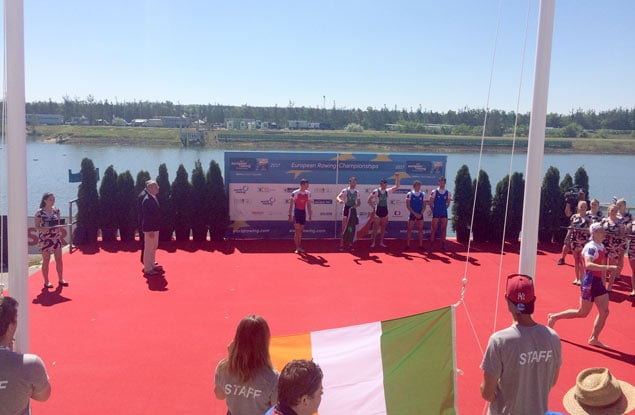 Mark O'Donovan and Shane O'Driscoll medal ceremony
Mark O'Donovan and Shane O'Driscoll medal ceremony
European Rowing Championships, Day Three (Selected Results; Irish interest)
Men
Lightweight Pair – A Final:
1 Ireland (M O’Donovan, S O’Driscoll) 6:32.34, 2 Russia 6:34.74, 3 Italy 6:34.89; 4 Britain (J Cassells, S Scrimgeour) 6:39.75.
Women
Lightweight Single Sculls – A Final: 1 Sweden (E Fred) 7:36.24, 2 Ireland (D Walsh) 7:38.00, 3 Switzerland (P Merz) 7:39.94.
Gold for Jenny Egan at World Cup in Portugal
#Canoeing: Ireland’s Jenny Egan won the K1 5,000 metres at the first canoe sprint World Cup in Portugal today. The 30-year-old paddler had just .77 of a second to spare over Spain’s Estefania Fernandez after the long battle. Lizzie Broughton of Britain was third.
Canoe Sprint World Cup, Montemor-O-Velho, Portugal Day Two (Irish interest)
Women
K1 200 – A Final: 9 J Egan 42.743.
K1 5,000 – Final: 1 Ireland (J Egan) 22 mins 52.8 seconds, 2 Spain (E Fernandez) 22:53.57, 3 Britain (L Broughton) 22:56.98.


























